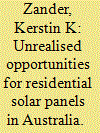| Srl | Item |
| 1 |
ID:
116764


|
|
|
|
|
| Publication |
2012.
|
| Summary/Abstract |
The reduction of greenhouse gases (GHG) is a highly prevalent public policy goal among European Union member countries. In the new White Paper on transport, the role of road freight transports in this is strongly emphasized. This far, however, the efficiency practices utilised in logistics firms are less studied. Drawing from policy goals and new survey data on 295 road transport firms our results show that hauliers are aware of the possible energy efficiency actions but lack the knowledge and resources to fully utilize them. Energy efficiency seems also to be unimportant for many shippers, so there are no incentives for hauliers to improve it. Examples from various countries show that clear energy efficiency improvements can be achieved with active cooperation between hauliers, shippers and policy makers. Such cooperation can be developed in Finland through the sectoral energy efficiency agreements. The novelty and the utility of these results allow scholars to answer important open questions in the national-level determinants of enhancing energy efficiency practices among road freight hauliers, and contribute to our understanding of how these can be fostered in public policies.
|
|
|
|
|
|
|
|
|
|
|
|
|
|
|
|
| 2 |
ID:
191392


|
|
|
|
|
| Summary/Abstract |
Tighter fuel economy standards came into force in the EU in 2020. Such standards reduce the usage cost of cars, encouraging people to drive more, a reaction known as the rebound effect. Whether and how to prevent the rebound is an ongoing policy debate – since the rebound eliminates parts of the expected fuel savings – yet the economic analysis of the rebound welfare implications is very scarce. To fill this gap, first the direct rebound for private vehicles in Switzerland is estimated and is found to be between 30% and 40%. Second, the utility surplus from the extra kilometers is estimated for each household, at 7 cents per kilometer on average. This is half the external costs of driving in Switzerland (15 cents per km). This gap supports a rebound mitigation, for instance through an internalization of external costs with a tax on the distance driven.
|
|
|
|
|
|
|
|
|
|
|
|
|
|
|
|
| 3 |
ID:
176805


|
|
|
|
|
| Summary/Abstract |
Rooftop solar power production is particularly relevant to climate change mitigation in Australia given the country's high insolation rates. However, residential adoption rates vary across the country with potential for increasing uptake, particularly on apartment buildings and rental properties. This study focuses on past and future motivations for the adoption of rooftop solar panels and the barriers people perceive upon adoption. An online survey was conducted with 1126 respondents across Australia showing that 65% of those who had no solar panels were intending to adopt them. Results of best-worst scaling showed that motivations for past and future adoptions did not differ significantly and that economic motivations predominated, particularly for homeowners. Renters, a group often overlooked in the production of solar energy, strongly desired solar panels, often for environmental reasons, but were discouraged by uncertainties about the costs and benefits of installing solar. This reveals a need for policies that help renters and landlords, and those in multi-unit dwellings, to find ways in which the costs and benefits can be shared equitably. This will become more important as energy costs rise and urbanisation intensifies.
|
|
|
|
|
|
|
|
|
|
|
|
|
|
|
|